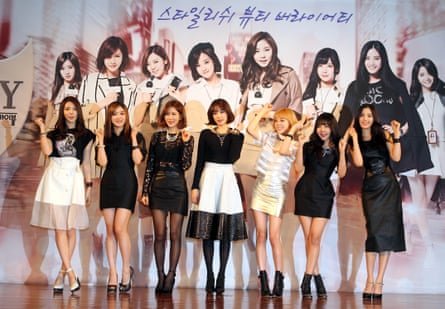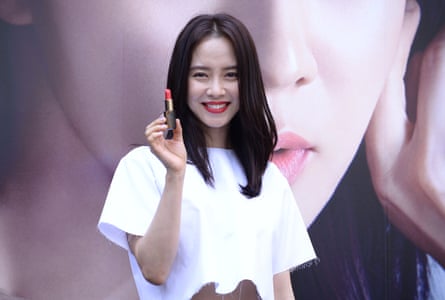When Cha Ji-won decided to throw out all her makeup and cut her hair, her mother was the first to tease her: “Oh look, I have a son now.”
For more than a decade, starting when she was 12, Cha would meticulously apply cosmetics, chasing the narrow definition of beauty that dominates South Korean society. In middle school, she applied foundation to lighten her skin tone, avoiding teachers who would punish her for violating school rules.
She watched YouTube make-up tutorials to hone her skills and by her early 20s would spend as much as 100,000 won (£70) a month on cosmetics. But amid a wider feminist awakening in South Korea, Cha has chosen to ditch her makeup, lipstick and dyed blonde hair.
“I felt as if I had been born again,” Cha said. “There’s only so much mental energy a person has each day, and I used to spend so much of it worrying about being ‘pretty’. Now I use that time to read books and exercise.”

Cha is part of a growing movement in South Korea fighting against unrealistic beauty standards that call for women to spend hours applying makeup and perform skincare regimes that involve 10 steps or more at each end of the day. Among their complaints is that women must wake up two hours before work to ensure perfect makeup, meticulously removing dead skin with peeling gel and steam towels before beginning their regimen.
Women sick of the laborious routine have started to post videos on social media of destroyed piles of cosmetics with the catch-cry “escape the corset”, likening makeup to the garments that were part of daily women’s garments for years and worked to constrain bodies into a uniform shape.
The trend is part of a larger push against the country’s patriarchal society that has seen record numbers of women take to the streets to demand greater equality and fight against issues such as illegal filming and sexual assault.
The movement is an interesting turn in South Korea, a nation that actively promotes its prowess in cosmetic surgery – as much as a third of young women have gone under the knife – and whose cosmetic brands are coveted around the world with an industry worth about $12.5bn (£9.7bn), according to Euromonitor.

‘They can’t have any power over me’
Cha now spends about 4,000 won (£2.75) a month at most on moisturiser and lip balm, and has started a YouTube channel to raise awareness of feminism, using the same platform that once taught her makeup techniques.
South Korea’s exacting beauty standards are the result of several factors that have combined to encourage women to aim for pale skin, big eyes, a high nose bridge, skinny legs, cherry-like lips, a small face and a nine-to-one body ratio, where the body is nine times as long as the face. While every country has its own sense of what is ideal, South Korea’s strong conformist streak has led to millions striving to achieve the same look.

But over the past few months, the tide has started to turn, with thousands of posts on social media showing women smashing their cosmetics as a way of rejecting mainstream ideas of beauty. One theme running through the movement is the idea of a beauty regimen as a form of labour, one that only women are expected to perform and for which they are in no way compensated.
In one video two women dump eye shadow, foundation, blush and nail polish onto a white sheet, creating a Jackson Pollock-style canvas. “I was embarrassed to go outside without this in the past,” one of the women says. “They can’t have any power over me when it’s so easy to break them.”
In another post on Twitter one woman remarks: “I can’t believe I wore this on my face.”
While there are currently no statistics showing a drop in cosmetic sales, anecdotal evidence suggests the movement is hitting bottom lines. An anonymous official at a top South Korean cosmetics retailer was anxious about the new trend and planned to focus on increasing sales to men, according to local media. Another makeup company employee said firms were afraid to even admit the movement could be affecting them.
Rejecting makeup is only part of the campaign against prevailing beauty standards. A Korean news anchor at one of the country’s main televisions stations sparked a flurry of debate in May when she became the first woman to wear glasses on air.

Separately, Jiwon Park started an Instagram account last year to promote body positivity and fight back against the narrow definition of beauty in South Korea.
“The movement doesn’t only aim to challenge the sexual objectification of women, but also change the status of women as subordinate to men,” said Lee Na-Young, a women’s studies professor at Chung-Ang University in Seoul. “As a result, we’re not only seeing a change in makeup and cosmetics but also the way women dress.”
“These women are experiencing liberation, and once they experience that, there’s no going back.”
With additional reporting by Kyungmi Choi

Comments (…)
Sign in or create your Guardian account to join the discussion